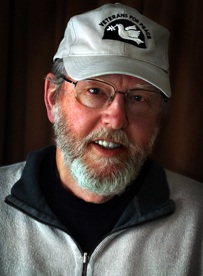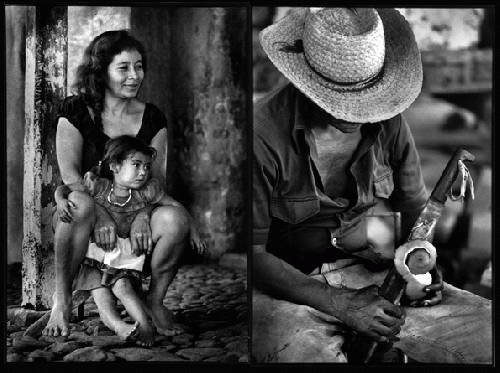As I traveled around El Salvador into the rebel zones of Chalatenango, San Vicente and on the Guazapa volcano, I ran into guerrillas and "delegates of the word," un-ordained peasants who told the story of the Liberation Theology Jesus, who preached one could ask for change now in this life. To back up their spiritual message they had the FMLN, the Farabundo Marti National Liberation Front, established in 1980 seven months following the assassination of Archbishop Oscar Romero, a conservative, bookish priest promoted to that high office by a conservative church that figured he'd be a safe bet. He backfired. This quiet, unassuming priest became attuned to the compassionate Christ and began to listen to the poor and to speak out against rightist violence. To young men shanghaied into the military and used to kill their own people, he spoke out publicly and eloquently. While giving mass to a group of nuns in a small chapel, Romero was shot through the front door by a man with a rifle in the passenger seat of a car.
Violence in Central America is foundational, reaching back to the days of the Conquistadores, adventurers who came looking for gold. All Salvadorans know about La Matanza, or The Slaughter. In 1931 Maximiliano Herna'ndez Martà nez took power in a coup; the following year, among others, Farabundo Marti led a peasant revolt. The reaction was horrific: within a short time estimates have it that up to 40,000 peasants and political opponents were murdered, imprisoned or exiled. Because of La Matanza, Salvadoran peasants no longer wear native costumes, since that fashion was how victims were identified to be killed. Salvadoran peasants abided until another wave of opposition to oligarchic outrages took root in the 1970s. A grassroots military force arose and was named for Farabundo Marti. Liberation Theology took on the oppression of the Roman Catholic Church. Solidarity with North Americans was established, leading many North Americans like myself to trek south for answers person-to-person and on the ground, fed up with relying on the tired old Cold War narrative that struggling, even angry, peasants were communists to be crushed like vermin. As a Marine Vietnam vet I knew loved to say: "Kill a Commie for Mommie."
Concerning Liberation Theology, Gustavo Gutierrez from Peru writes in We Drink From Our Own Wells that "Liberation is an all embracing process that leaves no dimension of human life untouched, because when all is said and done it expresses the saving action of God in history." One might say Gutierrez is exploiting the idea of God to advance the interests of the poor in Latin America. And they'd be right, in my atheist mind. Writers on the right like Dinesh D'Souza and John Hagee feel the Liberation Theology God is a false God, while they're certain God is really on the side of Imperialism and Capitalism. Napolean reportedly said: "God is on the side of the force with the most logistics." The point for me is when we get to the level of oppression and killing as a means of solving the human problems of fairness and justice, well, I wouldn't deny Latin American peasantry the right to manifest their natural human spiritual yearnings any way they like.
In this i-phone, social media age, the struggle between peasant dignity and imperial power that has played out so cruelly in Central America has now come north to meet us at the long US border with Mexico. It has become a battle zone. US involvement to Central America's problems are so historic and so profound that we hear virtually nothing about it. This fact must be related to Joseph Goebbel's idea of "the big lie." If assumptions become accepted in a culture like breathing or the weather, then one can say (or not say) virtually anything as long as it's in alignment with the cultural assumptions.
We live in a world overwhelmed by corruption, secrecy and the sophisticated use of violence. As in the dark ages, religion becomes a haven of certainty. Globalization is taking over the globe at the same time weakened nation states are overcompensating with fervent nationalism. In this situation, the plight of poor Central Americans in that of being between a rock and hard place. Oligarchs in places like El Salvador are part of the same class as those with wealth in the United States; artificial intelligence and robotics loom over the functions of production. The peasantry in Central America are part of a future world where working people will become superfluous. Political movements like Make America Great Again and rightist efforts to oppress the immigration of those caught between the rocks of Central America and the hard places along the US Border only want to deal with the "winners" in this cruel distribution of humanity.
The newly elected president of El Salvador is an interesting wrinkle in the Central America US Border Blues. He's not connected to either the right-wing ARENA Party or the left-leaning FMLN Party. President Nayib Bukele recently did something very unusual: He took responsibility. "People don't flee their homes because they want to," he said in English. "They flee their homes because they feel they have to." Then he said the unthinkable: "It is our fault. " We can say President Trump's policies are wrong. We can say Mexico's policies are wrong. But what about our blame?" He acknowledged it was economic duress and insecurity that drove people north. "They feel it is safer to cross a desert, three frontiers, and all of the things that may happen on the road to the United States because they feel that's more secure than living here." As for the Trump administration, he said: "I think they are approaching this in the wrong way. History has shown that this will not stop migration." Like Pete Buttigieg here in the US, Bukele is 37-years-old. Can his youthful honesty and freshness move this issue toward sanity? Does he have the backbone necessary? Or will he be chewed up by the violence of Salvadoran and US politics?
The cruelty of the Trump administration at the US border is hardly a new phenomenon. It's the same old story, only more desperate. Nothing positive can ever be done unless and until the history of US involvement with Central America is honestly brought into the discussion.
"Satan would wish to tell us that our way should be easy," Norman Mailer's Jesus tells us. Nothing is as "easy" as the Tweet-based violent approach advocated by Donald Trump: Lock 'em up. Be brutal, and they'll go home. Novelist Mailer concludes that won't work; the only possible answer is Love. Hard-earned Love: Something the much-oppressed people of Central America know well and which I profoundly witnessed back in the 1980s.
[All photos taken by the author in El Salvador in the late 1980s.]
(Note: You can view every article as one long page if you sign up as an Advocate Member, or higher).






